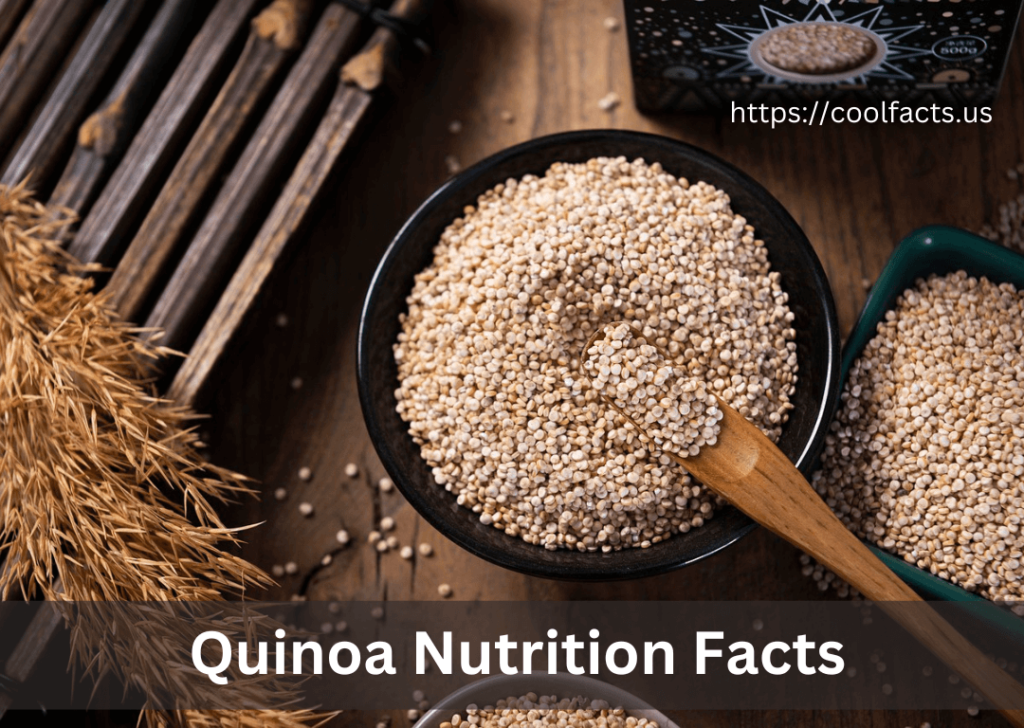Quinoa, pronounced keen-wah, has rapidly risen from obscurity to become a staple in health-conscious kitchens worldwide. Celebrated for its exceptional nutritional profile, this ancient grain offers a plethora of health benefits that have captured the attention of both nutrition enthusiasts and experts alike. Let’s delve into the fascinating world of quinoa nutrition facts and uncover why this pseudo-cereal has garnered such widespread acclaim.

What is Quinoa?
Before we unravel the nutritional intricacies of quinoa, it’s essential to understand its origins and composition. Quinoa is not technically a grain but rather a seed harvested from the flowering plant Chenopodium quinoa, which belongs to the amaranth family. Indigenous to the Andean region of South America, quinoa has been cultivated for thousands of years, revered by ancient civilizations for its sustenance and medicinal properties.
The Power-Packed Nutritional Profile
Quinoa’s meteoric rise in popularity can be attributed to its unparalleled nutritional density. Packed with essential vitamins, minerals, and macronutrients, it stands as a nutritional powerhouse among grains.
Protein Prowess
One of the most remarkable aspects of quinoa is its high protein content. Unlike most plant-based foods, quinoa is a complete protein source, meaning it contains all nine essential amino acids required by the human body. This makes it an excellent protein source for vegetarians, vegans, and individuals looking to diversify their protein intake.
Rich in Fiber
Quinoa boasts a significant fibre content, with both soluble and insoluble fibre varieties. Fiber is essential for digestive health, promoting regular bowel movements, preventing constipation, and reducing the risk of gastrointestinal disorders. Incorporating quinoa into your diet can contribute to improved digestive function and overall well-being.
Abundant in Vitamins and Minerals
In addition to protein and fibre, quinoa is teeming with essential vitamins and minerals. It is particularly rich in:
- Iron: Vital for transporting oxygen in the blood and preventing anaemia.
- Magnesium: Plays a crucial role in muscle function, energy production, and bone health.
- Phosphorus: Essential for bone formation, cell repair, and nutrient utilization.
- Manganese: Acts as a cofactor for various enzymes involved in metabolism and antioxidant defence.
Health Benefits of Quinoa Consumption
The nutrient density of quinoa translates into a myriad of health benefits for those who incorporate it into their diets regularly. Here are some notable advantages:
Weight Management
Due to its high protein and fibre content, quinoa can promote feelings of fullness and satiety, reducing overall calorie intake. Incorporating quinoa into balanced meals can aid in weight management and support healthy eating habits.
Heart Health
Quinoa’s heart-healthy properties stem from its abundance of fibre, magnesium, and antioxidants. These nutrients help lower cholesterol levels, regulate blood pressure, and reduce the risk of cardiovascular diseases, such as heart attacks and strokes.
Blood Sugar Control
The complex carbohydrates and fibre found in quinoa contribute to stable blood sugar levels, making it an excellent choice for individuals with diabetes or those aiming to manage their blood glucose levels effectively.
How to Incorporate Quinoa into Your Diet
Now that we’ve explored the myriad benefits of quinoa, you might be wondering how to incorporate this versatile ingredient into your culinary repertoire. Fear not, as the possibilities are endless:
- Quinoa Salad: Toss cooked quinoa with your favourite vegetables, herbs, and vinaigrette for a refreshing and nutritious salad.
- Quinoa Bowl: Create a nourishing grain bowl by layering quinoa with roasted vegetables, protein sources like grilled chicken or tofu, and a drizzle of tahini or avocado sauce.
- Quinoa Breakfast Porridge: Start your day on a wholesome note by enjoying quinoa cooked with almond milk, topped with fresh fruit, nuts, and a hint of maple syrup.
Conclusion
In conclusion, quinoa’s stellar nutritional profile makes it a standout superfood in the realm of grains and pseudo-cereals. With its high protein content, fibre richness, and abundance of vitamins and minerals, quinoa offers a multitude of health benefits, ranging from improved digestion to enhanced heart health and blood sugar control. By incorporating quinoa into your diet through various culinary creations, you can embark on a journey towards optimal health and well-being. So, why not elevate your meals with the nutritional marvel that is quinoa?